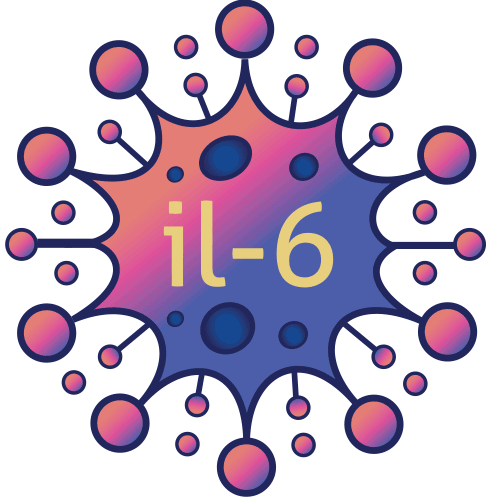
Interleukin-6 (IL-6) has increasingly been recognized as playing a significant role in the pathophysiology of bipolar disorder. Bipolar disorder is a mental health condition characterized by extreme mood swings, including mania and depression. Emerging research suggests that neuro-inflammation, involving elevated levels of pro-inflammatory cytokines like IL-6, contributes to the mood dysregulation and cognitive impairments seen in bipolar disorder.
What is IL-6?
IL-6 is a cytokine that is part of the body’s immune response and plays a central role in inflammation. While it is essential for responding to infections and injuries, chronic elevation of IL-6 has been associated with neuro-inflammation, which can negatively impact brain function. In individuals with bipolar disorder, elevated IL-6 levels have been found during both manic and depressive episodes, and it may be linked to cognitive decline, mood instability, and overall brain health.
IL-6 and Bipolar Disorder Research
Recent studies indicate that people with bipolar disorder have higher levels of IL-6 compared to healthy individuals, particularly during manic and depressive episodes. Elevated IL-6 is associated with increased oxidative stress, which can damage neurons, contributing to mood instability and cognitive dysfunction. By targeting IL-6 and reducing neuro-inflammation, researchers are exploring new ways to stabilize mood and improve cognitive outcomes for individuals with bipolar disorder.
Supplements to Reduce IL-6 Levels
Supplement | Dosage | Benefits |
NAD+ (Nicotinamide Adenine Dinucleotide) | 300 mg to 600 mg per day | Supports cellular energy production and has neuro-protective properties that reduce oxidative stress and IL-6, stabilizing mood and enhancing brain function. |
Lithium Orotate | 5 mg to 20 mg of elemental lithium per day | Stabilizes mood swings by modulating neurotransmitters and reducing excitatory activity in the brain. Reduces IL-6 and supports brain health by promoting neuron growth and repair. |
Omega-3 Fatty Acids (EPA and DHA) | 1,000 mg to 2,000 mg per day | Has anti-inflammatory properties, reduces IL-6 levels, and improves brain function. Helps regulate mood and reduce frequency of mood episodes in bipolar disorder. |
Curcumin (Turmeric Extract) | 500 mg to 1,000 mg per day | Lowers IL-6 levels, reduces oxidative stress, and protects the brain, supporting mood stability and cognitive function. |
Magnesium - Magnesium L Threonate | 300 mg to 400 mg per day | Regulates mood and improves sleep, reduces IL-6, and supports brain health, crucial for managing bipolar disorder. |
Vitamin D | 2,000 IU to 5,000 IU per day (based on blood levels) | Supports immune regulation, reduces inflammation, and can lower IL-6 levels, aiding in mood stabilization in mood disorders. |
Resveratrol | 100 mg to 250 mg per day | Lowers IL-6 levels, reduces inflammation, and has neuro-protective effects that support mood and cognitive function. |
Bupleurum (Chinese Herb) | 300 mg to 500 mg per day | Provides anti-inflammatory and immune-modulating effects. Reduces IL-6 levels and supports emotional stability, targeting systemic inflammation. |
Lifestyle Modifications to Reduce IL-6 Levels
Lifestyle Modification | Explanation | Actions |
Anti-Inflammatory Diet | A diet rich in anti-inflammatory foods helps reduce IL-6 levels and supports mood stability. Avoiding inflammatory foods can prevent mood swings. | Emphasize vegetables, fruits, whole grains, olive oil, and omega-3-rich foods (salmon, flaxseeds). Avoid processed foods, sugar, and trans fats. |
Regular Physical Activity | Regular exercise reduces IL-6 levels, improves neuroplasticity, and supports emotional regulation and cognitive function, reducing anxiety and mood instability. | Engage in walking, yoga, swimming, or other moderate-intensity activities. Exercise promotes mental health and stable energy levels. |
Stress Reduction | Chronic stress increases IL-6 and triggers mood episodes. Reducing stress through meditation, mindfulness, and deep breathing lowers inflammation. | Practice mindfulness, meditation, and deep breathing daily. Develop a consistent sleep routine to manage stress and mood effectively. |
Adequate Sleep | Poor sleep raises IL-6 levels and worsens mood instability. Proper sleep promotes emotional stability and reduces inflammation in individuals with bipolar disorder. | Maintain a regular sleep schedule, aim for 7–9 hours of sleep per night, and address any sleep disorders such as insomnia. |
Encouraging Thoughts on Treatment
The connection between IL-6 and bipolar disorder is an exciting area of research that offers new possibilities for managing this complex condition. By focusing on reducing inflammation and oxidative stress, which are both influenced by elevated IL-6 levels, individuals with bipolar disorder may experience fewer mood swings and improved cognitive function.
While bipolar disorder is a chronic condition, reducing IL-6 through targeted supplements, lifestyle changes, and potentially incorporating traditional herbs like Bupleurum offers a promising holistic approach to mood stabilization and improved brain health. As research continues, more effective treatments may emerge that directly address the underlying inflammation in bipolar disorder.

Comments